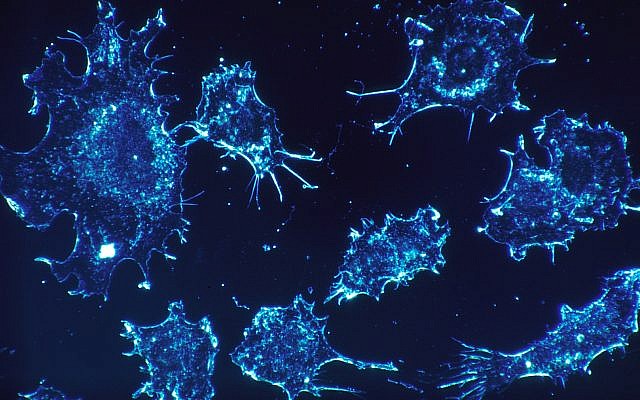Biotech Company Makes Big Promises. Can It Keep Them?
Big claims by an Israeli biotech company about a cure for cancer have spawned a variety of national and international headlines.
An Israeli biotech company claims it will have a cure for cancer within a year. Those are big claims by Accelerated Evolution Biotechnologies Ltd. that have spawned a variety of national and international headlines.
The truth behind such a promise, however, is very much in question, as it’s not uncommon to see hyperbole in the world of medical research, especially when it comes to a supposed cancer panacea.
Ilan Morad, CEO of the company founded in 2000, made the claim in an interview with The Jerusalem Post Jan. 28. In discussing how AEBi’s treatment could be revolutionary, he described the difficulties that arise from certain cancers becoming resistant to treatment as a result of mutation.
“Instead of attacking receptors one at a time, we attack receptors three at a time – not even cancer can mutate three receptors at the same time,” Morad said.
The idea of curing cancer is a thrilling possibility, one that would be universally heralded as one of the greatest medical miracles of all time.
In actuality, however, Morad’s statement seems likely to prove hyperbolic in terms of time frame, and even potentially methodology.
Forbes contributor Victoria Forster, a post-doctoral research scientist specializing in childhood cancers, took issue with Morad’s statement, calling it “categorically untrue.” She argued, “Cancers can have anywhere from one to tens of thousands of DNA mutations in their genomes, many of these being the ‘receptors’ Morad vaguely refers to.”
The AJT consulted a local oncologist, Dr. Stephen Szabo, to get to the bottom of the story about this supposed cancer cure.
Szabo explained that he had looked through some of the press releases about the studies that Morad claimed could potentially cure cancer.
“Every oncologist’s goal is ultimately to have a cure for cancer,” he said. “What I would say, though, is that cancer is not a monolithic disease. It’s thousands of diseases; it comes down to personalized medicine.”
He added that the theory behind the research was one that warranted investigation and could even be an exciting development in the future.
“They [AEBi] create a variety of peptides and they carry a toxin with them. Because it’s multiple peptides, it becomes difficult for a cancer to mutate to combat each of the peptides,” Szabo said.
While the possibility of more easily fighting mutations in cancer cells through AEBi’s technique could be exciting, Szabo was sure to note that proclamations like Morad’s have real costs.
“When you make these pronouncements, you’re potentially giving false hope to people,” he said. “I’ve had patients ask me about these things and it could be very exciting, but ultimately the proof is in the pudding.”
Szabo’s message is that patience and methodical research according to established methods are the correct ways to move forward, not through public statements and unkeepable promises.
“I think this is honestly an exciting time for cancer research. We can do so much more for patients with cancer than we ever have been able to before,” Szabo said. “We’re making headway, but we’re making headway because we’re doing methodical, practiced, measured research.”




comments